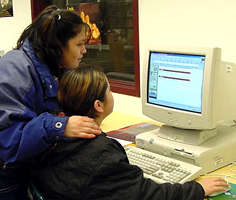The Internet is really a
READING issue:
New Literacies for New Times

Workshop for Connecticut Educational Media Association (CEMA)
Facilitators: Julie Coiro and Jill Castek, University of Connecticut
May 7, 2005
New Literacies for New Times

Workshop for Connecticut Educational Media Association (CEMA)
Facilitators: Julie Coiro and Jill Castek, University of Connecticut
May 7, 2005
| This
all day workshop invites
you to explore the new literacies of the
Internet while connecting the ideas to your school’s library media and
content area curriculum. In the morning, we’ll explore how the Internet
poses new challenges for students and demands new processes that extend
beyond traditional reading comprehension skills to encompass new
Internet literacies. Time will be provided to practice and reflect on new instructional strategies for weaving elements of Internet navigation, searching, critical evaluation, and communication into classroom instruction. We’ll also discuss how new online texts and higher level inquiry tasks, when used appropriately, provide an optimal environment for enhancing reading comprehension for all students. In the afternoon, we’ll have conversations about how we might begin to measure new literacies and work towards extending elements of the current library media curriculum to incorporate the challenges posed by reading, writing, and communicating within complex and unbound Internet networks. |
